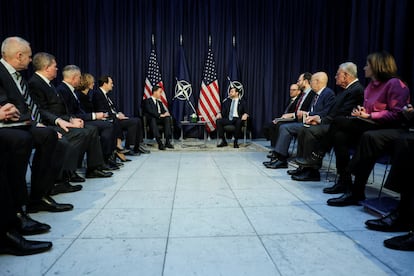J. D. Vance launches ideological attack on Europe that highlights rift between EU and US
At the Munich Security Conference, the vice president avoided talking about the war in Ukraine, and instead focused his speech on criticizing European action against the far right: ‘In Britain and across Europe, free speech, I fear, is in retreat’

Participants at the Munich Security Conference who were hoping U.S. Vice President J.D. Vance would offer clues about his administration’s plans to manage the conflicts in Ukraine and the Middle East saw their hopes dashed. Instead, what they did hear on Friday was a harsh ideological attack on European countries that evidenced a yawning gap between the two shores of the North Atlantic as the world hurtles into a dangerous spiral of confrontation between powers.
Vance made his position clear from the start: “The threat that I worry most about for Europe is not Russia. It’s not China. It’s not any other external actor. What I worry about is the threat from within—the retreat of Europe from some of its most fundamental values, values that are shared with the United States of America.”
From there, Vance developed a series of broadsides with the common thread that in Europe there is an anti-democratic reaction that seeks to suppress ideas — meaning the ideology of the far right — that are legitimate and should be, in his opinion, viewed differently in the public debate. The gap in visions evidenced by his speech and the previous one by president of the European Commission, Ursula von der Leyen, seemed at times like an abyss. To the strategic divergence, with a U.S. focused on China and little interest in Europe, is added an ideological one of such depth that it makes it difficult to imagine a minimally effective cooperation in the coming years. It is not only Elon Musk — the man who accumulates the power of being the richest man in the world and, at the same time, being one of Trump’s main advisors — who seems determined to interfere in the politics of other countries by openly supporting local far right groups. From the White House itself there is an open operation of whitewashing and support that is occurring, in the case of Germany, in the middle of an electoral campaign.
Vance railed against the annulment of the presidential election in Romania that saw a pro-Russian candidate elected after a shady campaign of support on the Chinese network TikTok — a move he said was decided on “flimsy suspicions”; he lamented the alleged suppression of anti-feminist opinions; he interfered in German politics, arguing that “there is no room for firewalls” (in reference to the mainstream political parties’ isolation of the far-right AfD in Germany); and he maintained that there is nothing more important than the fight against excessive immigration. Alice Weidel, AfD candidate for chancellor in the elections on February 23, praised Vance’s “excellent” speech.
Excellent speech! "There's no room for firewalls!"
— Alice Weidel (@Alice_Weidel) February 14, 2025
Die beeindruckende Rede von @JDVance in München - natürlich ohne jeden Applaus von CDU, CSU, SPD & Grünen - jetzt ansehen und anhören. Mit deutschen Untertiteln! #Sicherheitskonferenz pic.twitter.com/UQ95r1JLf2
Those who were hoping to find out more about Donald Trump’s decision to engage in direct dialogue with Russian President Vladimir Putin without consulting Ukraine or the Europeans in advance — even as Defense Secretary Pete Hegseth made it clear that Kyiv should rule out the prospect of joining NATO or recovering territories — were told instead that the greatest threat to Europe is not the Kremlin’s tanks and missiles, but the alleged excesses of the reaction to the rise of the far right.
Sick societies
Vance jokingly encouraged Europeans: if the U.S. could withstand the interference by environmental activist Greta Thurnberg, Europe should be able to withstand that of Elon Musk. He also argued that the voices of the people must be heard; that societies that fear the opinions of their citizens are sick societies.
Vance not only avoided references to the war in Ukraine, but also to how the party he represents in his country has abused freedom of speech, for example, by spreading outright lies against immigrants, claiming that they eat the pets of white people in the U.S. He also avoided mentioning the problem posed by the fact that the richest man in the world is also arguably the most influential figure in the U.S. government, the owner of a major digital communications platform that systematically spreads self-serving hoaxes, and also of another platform of increasing importance in the field of internet connections.
The rift between the U.S. and traditional Europe is thus growing on multiple fronts. On the military front, Washington clearly expects Europe to look after itself. On the ideological front, the leaders are at ideological antipodes. On the economic front, a possible full-scale trade war is brewing.
Von der Leyen referred to this issue in her speech. “Trade wars and punitive tariffs are pointless. These are taxes, they lead to inflation, and workers, companies, low-income people, and the middle class on both sides of the Atlantic suffer the most. We want to avoid a race to the bottom. But, as we have already made clear, unjustified duties on goods from the EU will not go unanswered. Let me put it bluntly: we are one of the largest markets in the world, we will use our tools to protect our economic security and interests,” she said.
After Vance and Von der Leyen, Wang Yi, China’s top foreign official, spoke at the plenary session. As usual, he tried to portray Beijing as a stabilizing force amid the turbulence shaking up the world order. And, in what sounded like a significant nod to Europe, he said: “We don’t have to be rivals.”
Then Boris Pistorius, Germany’s defense minister, replied very clearly to Vance: “Democracy does not mean that a noisy minority can decide what is the truth. Democracy must be able to defend itself against extremists.” The North Atlantic widened on Friday with the crushing weight of the bitter words spoken in Munich.
Sign up for our weekly newsletter to get more English-language news coverage from EL PAÍS USA Edition
Tu suscripción se está usando en otro dispositivo
¿Quieres añadir otro usuario a tu suscripción?
Si continúas leyendo en este dispositivo, no se podrá leer en el otro.
FlechaTu suscripción se está usando en otro dispositivo y solo puedes acceder a EL PAÍS desde un dispositivo a la vez.
Si quieres compartir tu cuenta, cambia tu suscripción a la modalidad Premium, así podrás añadir otro usuario. Cada uno accederá con su propia cuenta de email, lo que os permitirá personalizar vuestra experiencia en EL PAÍS.
¿Tienes una suscripción de empresa? Accede aquí para contratar más cuentas.
En el caso de no saber quién está usando tu cuenta, te recomendamos cambiar tu contraseña aquí.
Si decides continuar compartiendo tu cuenta, este mensaje se mostrará en tu dispositivo y en el de la otra persona que está usando tu cuenta de forma indefinida, afectando a tu experiencia de lectura. Puedes consultar aquí los términos y condiciones de la suscripción digital.









































